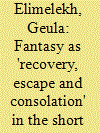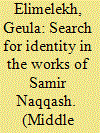|
|
|
Sort Order |
|
|
|
Items / Page
|
|
|
|
|
|
|
| Srl | Item |
| 1 |
ID:
130741


|
|
|
|
|
| Publication |
2014.
|
| Summary/Abstract |
Isaac Bar Moshe (1927-2004) was born in Baghdad and immigrated to Israel in 1950. This article deals with his literary world, which is split between realism on the one hand and fantasy, mysticism and dreams on the other, with both these planes reflecting his perspective on various existential questions. The article focuses on the short stories in his book Behind the Wall (1973), which, like many of his other works, are largely anchored in his private life and depict a bleak reality, with dreams and fantasy offering the only hope of escape into a better, more spiritual world. The article concludes with an analysis of Bar Moshe's stories in terms of the three functions of fantasy - 'recovery, escape and consolation' - as formulated by writer and philologist J.R.R. Tolkien in his book Tree and Leaf.
|
|
|
|
|
|
|
|
|
|
|
|
|
|
|
|
| 2 |
ID:
121458


|
|
|
|
|
| Publication |
2013.
|
| Summary/Abstract |
Samir Naqqash (1938-2004) was born in Baghdad and migrated to Israel in 1951. This article describes his divided soul, his attempts to adapt to a new homeland and his inability to develop a sense of belonging to Israeli society. The study is based on two short stories, 'Willow Night', which describes the collapse of an old world and the loss of Jewish values, and 'Tantal', a story of childhood. A major theme in Naqqash's writings is the search for identity, a direct result of the author's inability to detach himself from his previous identity as an Iraqi Jew. This theme is intimately connected to one of the most important motifs in his stories, rootlessness. The author feels torn from a previous perfect world, now lost - a world which he now adores and remembers with sentimental yearning. In his stories he depicts a number of characters whose emigration to Israel induced a profound shock in them, which eventually led to their mental and physical downfall.
|
|
|
|
|
|
|
|
|
|
|
|
|
|
|
|
| 3 |
ID:
179790


|
|
|
|
|
| Summary/Abstract |
American-Iraqi writer Sinan Antoon’s latest Arabic-language novel Fihris (2016), meaning ‘index’ or ‘catalogue’, is ostensibly the story of an academic, Namir, who returns to Baghdad as a translator for a documentary film company and Wadoud, an eccentric Baghdadi bookseller who is devoting his life to compiling a massive, unabridged history of Iraq’s 2003 war. Namir’s encounter with Wadoud in his shop leads to a representation of the Iraq’s macrocosmic polarities at every level. The leitmotifs of unending internal and external conflicting dualities amid the all-pervading insanity of war, violence and brutality form the backbone of a plotless story, whose language, style and structure is founded on themes of exile, memory, madness, time and trauma. This critique seeks to deconstruct the author’s creative tapestry of the two protagonists, their parallel worlds and their ultimate unification as one surreal spirit pointing to new hope for Iraq’s postwar future as one nation.
|
|
|
|
|
|
|
|
|
|
|
|
|
|
|
|
|
|
|
|
|